Volunteer report "Bringing smiles to children through self-proclaimed play therapy (*^^*)"
2025.11.05
Name:Mariko Kawamoto
Specialty:Public Health
It's unbelievable that a year and nine months have passed since I came to Malawi as part of the 2023-3 batch! I only have three months left of my term, and while I miss Japan and am excited about all the activities I want to do, I'm also feeling a sense of impatience, which is a complicated feeling.
Now it's late October, and Salima is finally getting serious, with days of the heat with no escape. The other day, the ladies finally took off their chitenji and headed out to the market because it was too hot. No matter how hot it was, they always wore chitenji over their clothes and wrapped them around their waists, which made me realize once again how extremely hot this is in my post.
I'd like to introduce one of the activities I've been focusing on recently: (self-proclaimed) play therapy! At Salima District Hospital, we run a children's clinic for children who have been infected with HIV through their mothers and are receiving treatment. The clinic is held on Saturdays every three months, aligning with their consultation and medication schedule, since weekdays are difficult due to school commitments. The goal is to make medical services more accessible for HIV-positive adolescents and to reduce their sense of social isolation.
The clinic offers:


When I explained the activity in advance, none of my colleagues had ever heard of Tanabata, so it seemed difficult for them to visualize, but I'm very grateful that they agreed to give it a try. They also suggested tying it into the Tanabata festival of drawing dreams for the future, telling the children, "In order to make your dreams come true, everyone needs to become adults. To do that, come to the hospital, take your medication properly, and overcome this disease!" They also suggested that hospital staff teach the children about HIV and how to take their medication properly.
On the day of the event, the children were understandably confused, having never heard of Tanabata. But with my colleagues translating into Chichewa and cheering them on, we got started smoothly. The children wrote their dreams on the front of the cards and the reasons behind them on the back. They enjoyed drawing with colored pencils and were deeply engaged in their artwork. When they shared their dreams aloud, they applauded and encouraged each other. Finally, they tied their wishes to the trees, hoping they would come true.
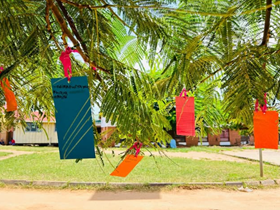
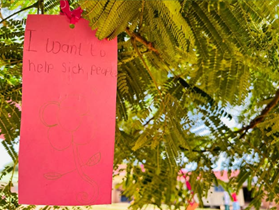
“I want to be a nurse!”
“I want to be a soldier!”
Many of the children are sick themselves and want to become doctors or nurses to help others like them, which I found very admirable and touching. Becoming a soldier is also popular - perhaps it's a Malawi-appropriate dream? Or perhaps it's Salima, where the military base is nearby? It was fascinating to try to guess!
Seeing the Tanabata cards and the trees swaying, the adults were also fascinated, saying "What a beautiful culture!" It was refreshing and delightful to see Tanabata, which is a familiar sight in Japan, being enjoyed by the people of Africa in this way.
Try 2: Drawing the Malawi National Flag with Handprint Art!
Following on from TANABATA, for our second challenge, we wanted the children to have fun by dipping their hands in paint and pressing their handprints onto paper to draw the Malawi flag. We wanted the children to enjoy the experience of working together to create something, so we collaborated with JOCV, who are in charge of Expressive Arts, to plan this activity!
We immediately started dipping our hands in paint and pressing them onto the paper.
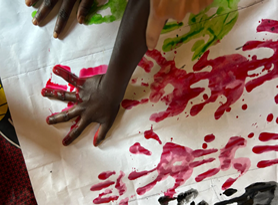
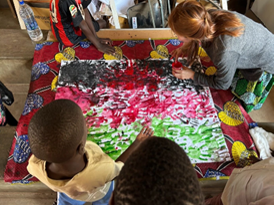
I wondered if the children had experience with this in their Expressive Arts classes, but it seemed like it was their first time doing it. They didn't make much noise, but their indescribable excitement was palpable, and it was adorable to see them leaning forward, eager to try.
Handprint art is surprisingly difficult, but thanks to the help of JOCV and fellow staff, we were able to paint the Malawi flag! The children were delighted and even displayed it on the wall themselves.
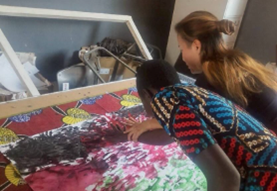
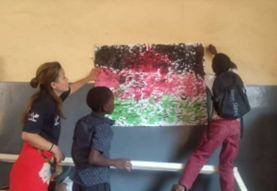
Coming to the hospital doesn’t have to be all serious and stressful. I hope to continue supporting my colleagues and the JOCV team so we can share our care and encouragement with the children. Above all, I want the children to keep believing in their dreams and stay motivated throughout their treatment.
scroll